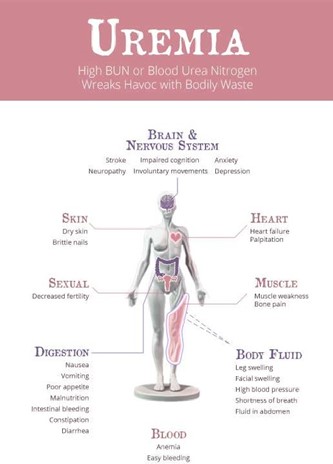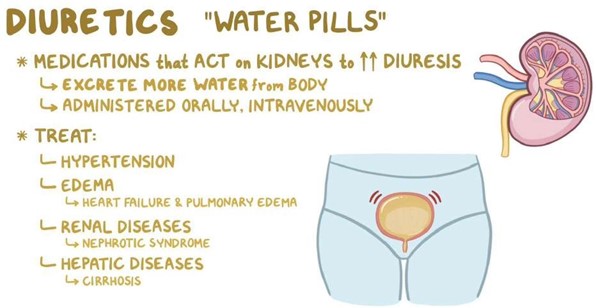What is the term for an excess of urea and other nitrogenous wastes in the blood as a result of kidney insufficiency?
Azotemia.
Uremia.
Anuria.
Oliguria.
The Correct Answer is B

Uremia is a condition where there is an excess of urea and other nitrogenous wastes in the blood, usually excreted by the kidneys into the urine. It occurs when the kidneys stop filtering toxins out through your urine and can be a sign of end-stage renal (kidney) disease.
Choice A is wrong because azotemia is the buildup of nitrogen waste products in the blood, not urea.
Choice C is wrong because anuria is the absence or reduction of urine output.
Choice D is wrong because oliguria is the low output of urine.
Nursing Test Bank
Naxlex Comprehensive Predictor Exams
Related Questions
Correct Answer is B
Explanation
Hyponatremia is a condition where sodium levels in your blood are lower than normal. This can cause symptoms such as nausea, headache, confusion, muscle weakness and seizures. A hypertonic saline solution is a fluid that has a higher concentration of sodium than normal blood. It can help restore the sodium balance and prevent or treat the complications of hyponatremia.
Choice A is wrong because restricting fluid intake may not be enough to correct severe hyponatremia and may worsen the symptoms if the cause is sodium loss.
Choice C is wrong because encouraging increased fluid intake may further dilute the sodium levels and worsen the condition.
Choice D is wrong because administering a loop diuretic may increase the urine output and cause more sodium loss, leading to more severe hyponatremia.
Normal ranges for blood sodium levels are between 135 and 145 milliequivalents per liter (mEq/L).
Correct Answer is A
Explanation

Fluid overload, also called hypervolemia, is a condition in which the body has too much water.
It can cause edema, hypertension, shortness of breath, and cardiovascular problems.
Diuretics are medications that help the body remove excess fluid through urine.
They are commonly used to treat fluid overload caused by heart failure, kidney failure, cirrhosis, and other conditions.
Choice B is wrong because encouraging increased fluid intake would worsen the fluid overload and increase the risk of complications.
Choice C is wrong because providing a high-sodium diet would also worsen the fluid overload and increase the risk of complications.
Sodium is an electrolyte that regulates fluid balance in the body.
Excess sodium intake can cause water retention and increase blood pressure.
Choice D is wrong because elevating the affected extremities is not an appropriate intervention for fluid overload.
Elevating the extremities can help reduce swelling caused by local factors such as injury or inflammation, but it does not address the underlying cause of fluid overload.
Whether you are a student looking to ace your exams or a practicing nurse seeking to enhance your expertise , our nursing education contents will empower you with the confidence and competence to make a difference in the lives of patients and become a respected leader in the healthcare field.
Visit Naxlex, invest in your future and unlock endless possibilities with our unparalleled nursing education contents today
Report Wrong Answer on the Current Question
Do you disagree with the answer? If yes, what is your expected answer? Explain.
Kindly be descriptive with the issue you are facing.
